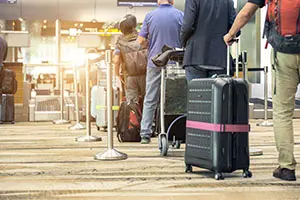PHOTO
Progress towards recovery in the international travel industry may be slowed by the Russian invasion of Ukraine, as the impact of a collapsed rouble, flight suspensions and economic sanctions are felt, experts have said.
The widely condemned invasion, which began on February 24, is believed to have created a cloud of uncertainty over the industry and is expected to impact Russian consumer spending.
Russia is the third-largest source market for Dubai tourism, according to Jaap Meijer, head of research at Arqaam Capital, and the second largest for the UAE as a whole according to Vijay Valecha, chief investment officer of Century Financial. Russia is also the third-largest source market for the wider Middle East region.
Meijer said the rouble’s decline against the dollar, which reached a fresh record low on Tuesday morning, along with the equity market collapse, the limits on FX and interest rates rising to 20 percent in relation to sanctions imposed by Western countries, will all have an impact on Russian consumer spending.
“2022 was supposed to be a year of recovery for the travel industry hit hard by the pandemic. But Russia's invasion of Ukraine may have slowed the progress,” Valecha added.
After two years of disrupted travel due to ever-changing COVID-19 restrictions, airlines and tour operators are once again bracing for closed skies, cancellations and a cloud of uncertainty over international travel.
“More than 30 countries have so far closed their airspace to Russia, with Moscow reacting in kind.”
Carriers will have to divert flights south, with resulting longer journey times on some flights, he said, and continued economic sanctions that involve flight cancellations will cool the Russian outbound market, as Russians experience uncertainty about their ability to return home after travelling.
"This may have a medium-term dent on the tourism industry in the Middle East as a significant chunk of Russians prefer the Gulf as a tourist spot,” he said, adding that bearish sentiment has kicked in which may take a while to fade away.
However, wealthy Russians are unlikely to be impacted and could still travel to the Middle East, he said.
Online travel company Cleartrip said a heavy dip was to be expected in Russian inbound and outbound tourism, with businesses that have huge exposure to the Russian market particularly impacted, and effects already seen in future bookings and itineraries.
“Businesses that depend heavily on Russian tourists will have to diversify and shield themselves from a disproportionate exposure,” the company said.
(Reporting by Imogen Lillywhite; editing by Cleofe Maceda)
imogen.lillywhite@lseg.com





















